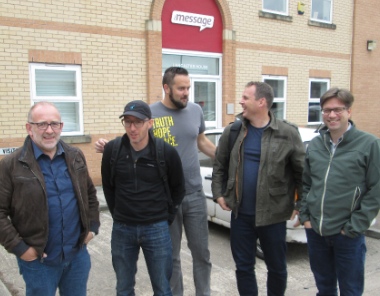
The visiting team from Vancouver: Bill Hogg (left), Jonathan Evans, Laurence East (actually from Kelowna), Paul Williams and Jonathan Bird.
Half a dozen local pastors and ministry leaders got a glimpse into a unique urban ministry in Manchester, England last week. We spent almost a week with Andy Hawthorne and members of The Message, which works with young people in the United Kingdom’s poorest communities.
The Message has many faces; a work that was once was closely focused on Manchester has now spread throughout Britain and even internationally.
Eden, a cornerstone of The Message, “sends urban missionaries to live sacrificially and love neighbourhoods back to life.” Thirty Eden teams have moved long-term into the poorest neighbourhoods in Manchester and several other major cities.
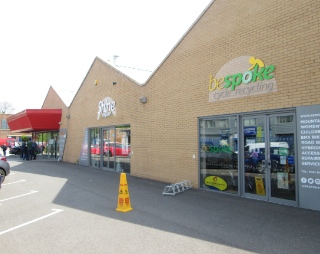
Two MEC storefronts (hair salon and bike shop) are in the foreground, while the Message offices and auditorium are beyond them.
Creative arts teams share the gospel through music, dance and theatre in schools, resulting in thousands of young people make decisions to live for Christ every year. Others help young people find Jesus in prison and assist with housing and jobs through MEC (Message Enterprise Centre), which oversees five businesses, including a hair salon and bike shop. The Oaks, a 12-bedroom house, is just about to be opened for those recently released from prison.
Other elements of the Message team include: three pop bands; a theatre company; a sex, relationships and self-esteem team; the Eden Bus, a high-tech mobile youth centre providing a safe ‘off the street’ environment for young people; and Message Academy, which trains and equips creative evangelists and urban youth workers.
The Message has just launched a five-year Higher Tour, which they are billing as the UK’s “largest mission to young people in a generation.” This excerpt on Higher Manchester from Flow (The Message’s magazine) gives a sense of their excitement and their hopes for the tour:
Four weeks, 55 schools, 23 youth groups and events, five explosive gospel concerts at the O2 Manchester Apollo. Through it all, 30,000 young people heard the good news and at least 2,000 chose to follow Jesus. And this was just the start.
Our team was made up of Bill Hogg, national missiologist with C2C Network Canada; Jonathan Bird, executive director of CityGate Leadership Forum and co-facilitator of the Vancouver Consultation; Paul Williams, executive pastor at Granville Chapel; Jonathan Evans, co-leader (with his wife Carla) of Boundless Vancouver; and Laurence East, lead pastor of Metro Community in Kelowna. Joining us for part of the time was pioneering urban missiologist Ray Bakke, who has been helping to guide the Vancouver Consultation process.
The Message founder Andy Hawthorne had invited Bill Hogg, and he in turn invited the rest of us to learn more about the ministry’s unique approach. We took part in the ministry’s two-day Proximity Conference, then sat in on their monthly day of prayer, worship and reports from the various streams of the work.
Hawthorne visited Vancouver in late 2014, already with the idea that some elements of The Message might work in Canada. Since then, it has expanded considerably around Britain, and has become well established in South Africa.
He will be in the Vancouver area in early June to talk with some local leaders about the Message model.
Our visit to Manchester proved at least four things to me:
- There are many signs of life in the British church, contrary to persistent rumours.
- Gospel proclamation should accompany gospel action.
- The Message has assembled an impressive team.
- There are already some natural links between The Message and Vancouver.
1. Signs of life in the UK
Most descriptions of church life in Britain seem to highlight declining church attendance, squabbling Anglican bishops and competition from a burgeoning Muslim population. While these stereotypes are far from the whole picture, they have a lot of truth to them.
One exception to the bleakness of the picture, of course, is Alpha, based in London. But we discovered some exciting signs of life in Manchester, and heard of other encouraging developments around Britain.
By all accounts, Manchester was a graveyard of the church by the mid-20th century. Hawthorne tells the story of visiting the Bishop of Manchester about working with youth groups and being told there were really no significant youth works in any of Manchester’s many Anglican churches.
Things have changed now, and The Message is very much part of that change. Our first two days were spent as part of a 300-strong crowd of Message workers, and potential workers, from all over Britain.
We saw firsthand a couple of other signs of life in the UK church as well. On Sunday we attended Ivy Church, a dynamic free church with hundreds of people of all ages meeting in a multiplex theatre.
Then there was Pete Greig, founder of the well known 24-7 Prayer movement. He stopped in for a couple of hours at the Message centre to encourage workers and to report on his own work. He tweeted May 16:
In #Manchester with @MessageTrust – pioneers of urban mission. One of my favourite organisations anywhere.
Greig reported on Thy Kingdom Come, in which leaders of the Church of England invited all believers to join them in praying “to ignite a fresh passion for sharing the Gospel.”:
Jesus Christ calls every person to follow him. As Christians it’s our duty and joy to share that invitation. That’s why the Archbishops of Canterbury [Justin Welby] and York [John Sentamu] are inviting every church in England to join a week of prayer this Pentecost, from 8 – 15th May – let’s pray for every Christian to receive new confidence and joy in sharing this life-transforming faith.
Beacon Events concluded the week at six key cathedrals – Canterbury, St. Paul’s, Coventry, Exeter, Winchester and Durham – and involved Worship Central leaders such as Matt Redman and Tim Hughes. Greig himself had come directly from the event at Canterbury Cathedral.
2. Proclamation and action
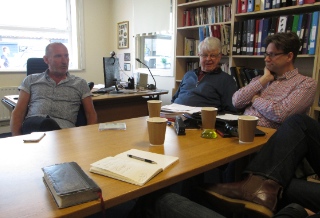
We met with Andy Hawthorne in his office shortly after arriving. Ray Bakke and Jonathan Bird pictured with him.
Hawthorne is abundantly clear on the need for a balance of proclamation and action. On our first day at The Message, he sat down with our team and laid out some of the non-negotiable characteristics of his “full on word and deed” approach.
We need people moving in quietly, anonymously almost, to poor neighbourhoods, he said, but we also need to be a “light on a stand,” proclaiming the gospel boldly and loudly. He added:
It is the gospel imperative to live alongside the people, but it won’t work without unashamed proclamation of the gospel as well. Unless everyone in the community has heard the gospel as well as seeing it demonstrated, we’ve failed really. Eden is key. Going to the poor is a gospel imperative; it’s almost certainly going to be from the bottom up isn’t it?
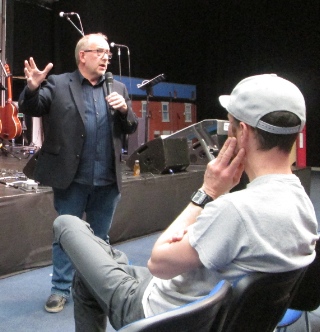
Bill Hogg of the C2C Church Planting Network, based in Metro Vancouver, was a keynote speaker at the Proximity Conference.
Bill Hogg was one of two keynote speakers for the Proximity Conference (the other, Simon Guillebaud has an amazing testimony of living with his wife and children in the poverty-stricken and increasingly dangerous nation of Burundi).
Hogg’s day job is as a missiologist for the C2C church planting network. But during his two reflections on Isaiah 58 he sounded more like a prophet, and his focus on social justice was warmly appreciated. (His charming Scottish brogue, wit and comfortable transitions from theology to popular culture may not have harmed his cause.)
Reading verses 6 – 7, he said, “Deep concern for justice and love for God are intertwined in scripture”:
Is not this the fast that I choose:
to loose the bonds of wickedness,
to undo the straps of the yoke,
to let the oppressed go free,
and to break every yoke?
Is it not to share your bread with the hungry
and bring the homeless poor into your house;
when you see the naked, to cover him,
and not to hide yourself from your own flesh?
He added:
We want to be known as the rebuilders of walls and restorers of homes. This has drawn us to Isaiah 58, an awesome passage that challenges us again not to avert our eye from the poor, not to settle into the religion of good service, not to contradict our mission with detrimental lifestyles or simply to miss the point of why we have chosen to serve the urban poor.
Hogg quoted Ray Bakke as well:
We need a theology of the Philippians sort, which is Christ in us . . . Christ in me . . . But we also need a theology of Colossians. Colossian Christology is Christ over me – Christ who is the firstborn over all creation, the Christ who is the glue that holds the galaxy together. In him all things exist, the superglue of the cosmos. The Christ over us is the powerful Christ who exists in the fullness of the Godhead bodily.
The powerful public Christ allows us to do ecological justice work, to take on the city schools and sewer systems and healthcare and transit systems and to deal with discrimination by the banks against people of poverty. This Christ of Colossians handles all that. At the same time, don’t give up that personal Jesus of Philippians who lives in us and transforms us personally.
3. Impressive team
Andy Hawthorne is one of a kind. He was awarded the OBE (Order of the British Empire) in 2011, in recognition of his services to young people. His commitment has been lifelong. In the early days of The Message, he was still a member of the World Wide Message Tribe, a popular evangelistic dance band he helped form while working as a fashion designer.
He particularly admires Salvation Army founder William Booth, and is proud to point out that his great-grandfather went as a Salvation Army missionary to India, ready to die there for the sake of the gospel.
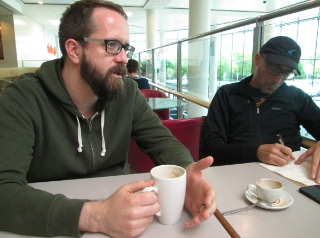
Sam Ward (‘Mr. Eden’) described the ethos and approach of the Eden Network to several members of the Vancouver team.
Since 1997, The Message has been involved in planting missional Eden teams at the heart of some of the United Kingdom’s most deprived urban communities. And Sam Ward, national director of the Eden Network, has been in the midst of the action. He moved into Openshaw in east Manchester with his wife Nicci in 2000, and they’re still there.
Jonathan Bird, Jonathan Evans and I had a good chance to chat with Ward one afternoon. His combination of passion and practicality – he’s an accountant by trade – were evident throughout the conversation. He described the five cornerstones to the Eden process:
- Partner with local churches. All Eden staff work for a local church, not Message Trust. Only the team leader is paid. The other members of the team are tentmakers, spending spare time in the ‘hood.
- Live in community. Teams make their homes at the heart of the community; they must live on site rather than in a neighbouring community. Some purchase homes there.
- Relationships are key. Eden is an incarnational network; homes are the heart of the community.
- Teamwork rules. All Eden projects are done in teams; starting with just one couple or a single person is not permitted.
- Youth focused. They’ve focused on young people historically, because they are the most accessible within a troubled Council Estate – it’s possible to change a community within a generation. (But Eden works with all ages.)
Ward says Eden communities are always set up in poorer areas. In fact, they aim for “the top five percent” (which others might call the bottom five percent). A couple of years ago he researched the nine Eden projects planted between 1997 and 2003, noting their rankings in the English Indices of Multiple Deprivation (IMD) produced by the UK government in both 2000 and 2010. His findings:
The IMD figures are generated from data held on income, employment, health and disability, education, skills and training, barriers to housing and services, crime and living environments. They are the government’s most accurate measure of the relative prosperity of every local area in England.
The amazing news is that in all of the nine local areas where we planted Eden projects in this period, every single one has improved in its ranking. For most, the improvement has been dramatic – and one has leapt 13,000 places (there are 32,482 areas).
Apart from Andy Hawthorne and Sam Ward, we had a chance to meet some several other committed and enthusiastic workers at The Message.
Linda, for example, works in administration and is about to move into The Oaks to live with people being released from jail. She has spent the past 10 years working in refugee camps on the border of Jordan and Syrian, and before that in the townships of South Africa near Mozambique. Danielle, PA for Hawthorne – which involves a wide variety of duties – was our tireless and cheerful chauffeur; her husband Andy is an Eden team leader.
4. Natural ties
Time will tell whether The Message will end up coming to Canada, let alone to Metro Vancouver. But there are already some natural ties, which is always a good sign. Foremost among them is the long-standing friendship between Bill Hogg and Andy Hawthorne, which stretches back 25 years to when they were both youth workers in the UK. They lost touch, but reconnected a few years ago.
As a result, Hawthorne visited Vancouver to meet some local leaders in the fall of 2014 (see report here), and will return for a couple of days in early June. Speaking to our group on the first day of our visit to Manchester, he said, “I’m really not desperate for this, but I am desperate not to miss the Lord.”
(On a personal note, I experienced a couple of serendipitous moments. Pete Edwards was seated right in front of me in the massive Ivy Church movie theatre meeting space. He introduced himself – and it turns out he is operations manager of Westminster Theological Centre. Not only does the college host classes at The Message centre, but two of their teachers are local friends – Bob Ekblad, who lives just across the border and has taught at Regent College, and Brad Jersak, who lives in Abbotsford. As well, I met Ash Barker at Proximity; he had shown me around his home turf in the slums of Klong Toey in Bangkok 12 years ago.)
And now, of course, a Canadian team has been to visit the Manchester Message HQ. In a debrief meeting on the last day, there was general agreement that we had been impressed by what we saw and there was no reason to think the Message/Eden model could not be a good fit in our area.
Hawthorne said, “We can’t just expect to bring Message in a box, but the heartbeat for urban youth, it works.”


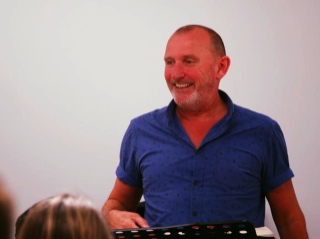
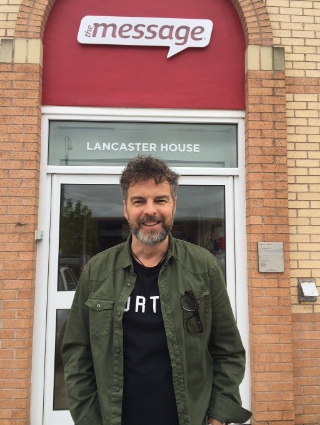
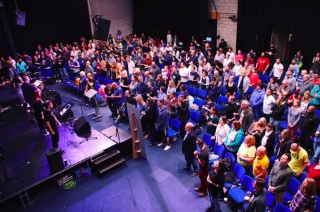
The Manchester (and far beyond) experience is wonderfully unbelievable! It is very encouraging that Paul Williams had the opportunity to be a member of the Vancouver team last week. It will be exciting to see how the fruit of those sessions will translate into an action plan in Vancouver.